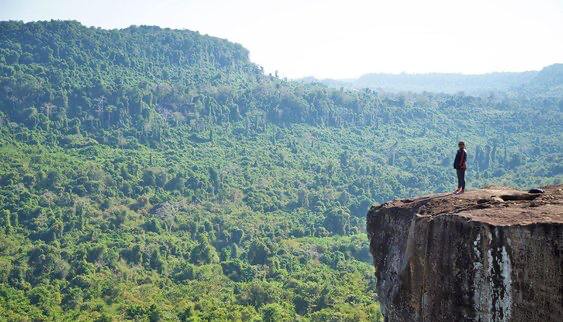Outdoor vacation destinations in Southeast Asia are plentiful. The travel and tourism spots in our part of the planet are renowned by pleasure seeking enthusiasts as world-class destinations. Islands, waterfalls, rivers, jungles, mountains oh my! There will soon be blogs about the best outdoor vacations in Cambodia and SE Asia, however subjective our list may be – we will attempt to provide a robust bunch of options, where you can also find your own resources to ascertain what is your preferred choice, like good old Trip Advisor. This is key to your dream vacation becoming a reality. At least within the eco-tourism sector hunt. Although, the travel agent does exist still – they are a tertiary adjunct of the industry. They will always be available but with websites offering you so much choice and seemingly seamless package deals, it’s up to you which beaten track or off the beaten path you take.
Not everyone can jet set around these natural and humid locales – but it’s not about how many places you can get to – rather the quality of the experience and the degree of satisfaction you reach! Everyone’s threshold for pleasure is different. For some, travel is about excitement and/or meeting new people, while for others it’s about seclusion and/or luxury. A general principal would be that the younger you are the more likely you want a budget guesthouse filled with party goers, while the older crowd prefers something more comfortable and away from the loud ruckus of music and random encounters. Either way, both two segments of the traveller are looking for a part of the serene, authentic, tropical exposé.
The degree of environmental and cultural enrichment that a person wishes to acquire during a vacation depends on several factors, like if they are stressed out and tired from work, they may not be so enticed to participate in long tours through a muggy jungle to see ancient ruins or wild animals. Most of these types of experiences are full day exhausting and taxing – yet rewarding trips! Unless you are paying a pretty penny to receive the top-notch guided experience where you do not need to get out of a private air-conditioned vehicle with WIFI, tinted windows, TV, snacks, reclining seats and plush cushions. Sounds like the life of a lucky fat cat, but what is lost? Clearly it is not calories.
This experience of travelling as an adult in a luxury bubble reminds us of the similarities of what is lost by many children in our modern technological system. They are missing the boat on their experiential learning and engagement with the environment. How is that for a tangential analytical comparison? Well, it’s important to remember that we are biological bipedal hominoid primates that depend on the earth for life as we move closer to converging even more with technology – which is removed from the equation.
Our developmental stages of learning require an outdoors phenomenological, iterative and immersive physical and mental challenge in decision-making for the youth to grasp the entirety of value derived from completing a task outdoors. Eco-tourism offers these benefits. Most nature hikes involve a lot of walking so finding the best shoes is self-care. As well as is buying any other gadget or spray desired for outdoor excursions into the unknown. There is a degree of romanticism about the beautiful landscapes you can envision that you find along the way in your travel journey.
For your child, the concern is – if your child does not go out and use the playground, or play sports, or spend any time outdoors, they miss acquiring important lessons in psycho-social relationship development between themselves and the environment they exist in – game theory. This is the notion that by being put into a new situated context, you develop and enhance strategic thinking and spatial awareness and learn to trust your senses – intuitive abilities. Going into nature is 100 times better for this skill. Further benefits are appreciating that you are not working, doing something you want, reconnecting with nature, etc. It is definitely therapeutic, unless you were bitten by something.
Anyway, not everything children should learn is through a screen, but rather humanity requires conditions that are unknown and embodied through the lived experience to acquire deeper meaning to life. The process of meaning-making is a place-based understanding. A philosophical topology.
If you climb a tree and the branch you are standing on breaks, you have learned a valuable lesson in knowing what your own weight can support, how strong you are, the dexterity you have by landing on your feet, forethought in assessing the sturdiness of the tree, the distance to the ground, the probability of surviving, the offer of your friend to catch you, the overall risk and reward of the game. But the game is not even played if your child is sheltered and prefers to be the anti-social social club and usually online in their room. This trend started with Generation X who used Atari’s and Nintendo 64, and then Millennials and Generation Z with Sony Play Station, WoW, Xbox, and now Generation Alpha – which is the most egotistical name to give an age group – with some two year olds able to navigate the web.
Most recently, reports have identified that our children’s eyes are deteriorating rapidly under the constant wanton need to hover over multiple screens that parents enable. From the phone, the iPad, TV and computer. The unnatural blue light is melting your child’s eyes, especially if they are under 15 years of age because their eyes are not formed completely. Although, adults who spend more than eight hours a day looking at screens, which is most people, are also suffering from myopic conditions – of limited visibility, and often an unhealthy weight from a more sedentary lifestyle compared to those that are online less than two hours a day.
To reiterate the benefits of being outdoors, the individual determines which value is earned by putting an effort forth to choose a different path or activity, to achieve that goal and to celebrate in mastering the unknown, and/or a shared comradery with a partner or team. This is also part of the online gaming experience; however, they are disembodied virtual entities in the form of avatars.
Finding your own way as a child or an adult is an irrevocable part of developmental growth in knowing yourself and connecting to the outside world. The more we continue to remove the outdoor experience from the next generation and adults on vacation, we lose the value of not only the adventure but the value of reaching somewhere that involved you putting each leg forward, maybe even looking at a map, dealing with the weather, critters and locals to reach the destination yourself – with self-assuredness and self-belief.
For example, to the contrary, the rotund elderly couple who paid for an all-inclusive resort where they binge eat and drink are carried from scenic views to gorgeous waterfalls – and simple say “whatever,” when they arrive. But if they had to make the journey themselves, on a horse or walking for many kilometers, they would be so much more impressed of their accomplishments when reaching the waterfall and putting the cool, clean H₂O on their face – in appreciation for being refreshing and worth the effort. It’s all about a desired perception and satisfaction. Some would even say that we shouldn’t pave roads to every scenic destination and leave them only for the physically fit to find. The rest can either work toward such a goal, or just watch a documentary of the scenic site instead, while eating a bag of chips on the couch. What did you really want to get out of the trip anyways? When you cheapen nature, she will disappoint you.
If there is no sense of accomplishment from an outdoor trip, it’s because little effort was taken, and no value was placed on reaching a desired highlight of the excursion. But sometimes the destination lacks sufficient infrastructure, looks shabby, isn’t managed to standard and dirty, or just overhyped. In that case lack of accomplishment is reinstated as the fault of the management of the local tourism operation and not of the pleasure-seeking vacationer who pushed themselves.
The direction of the next generation is a result of so many outside influences that have shaped their behaviour in a way that blame is not fair to rest on their young shoulders. Did you as a child spend a year inside during Covid? What did we want them to do? If outside was danger, the inside of the house ended up being the place where they spent more time. Many countries have curtailed public space freedoms, for privatized spaces with cameras and even tracking devices. Playgrounds for small children are around, but teenager space is limited and often more deleterious, as they prefer to be out from under the guise of parents and CCTV cameras. Dance clubs are closing more than they are opening around the world, and identity politics has made many youths feel more comfortable behind a screen rather than in crowds of different people who you may offend or be offended by. This is more of a North American and European slant, while in Southeast Asia, families are much more visible on the streets and in public. This is almost completely a different world based on different values, but rest assured the next generation in Asia is super tech savvy too and needs a kick outdoors.
With this being said, videogame systems and online roll playing games do have a lot to offer when it comes to developmental skills. Also, it is a respite and a safe zone in your room. You are in control and the people you invite to play against or with can be deleted if they annoy you. This degree of power and agility in hand eye coordination is beneficial for developmental growth, but it is no replacement for the outdoors. Remember it’s all in their head, so there is a direct detachment from their original nature. Also, if they cannot make the value connection or develop a relationship with the earth through lived experiences, then the real-world becomes the abstract source of life and the virtual becomes the preferred reality. A foreboding dystopian technological autocracy is additionally cringe-worthy.
Anyway, most of the next generation seem to have a strong sense of value for the impending doom of earth, whether they have gone camping or not. The deluge of information their brains have absorbed is a disgraceful juggernaut of often jumbled data that their subconscious misinterprets depending on their capacity. Going outdoors is a different pace. A manageable pace. A humane pace that does not involve 1000 bytes of algorithmic data being projected into our brains.
The bottom line is that going outdoors is healthy. Walking outside for 20 minutes a day has profound benefits, if your city isn’t polluted and crime riddled. Even better if you can plan an eco-tourism trip in your region to gain valuable local knowledge and experience, as we have promulgated as a must do, for your health and for your children’s development. Lastly, the earth is currently sliding into our 6th mass global extinction – at least that is what our AI overlords tell us at ChatGPT. Ignorance to this truth isn’t going to change reality. Many places in the United States continue to remove the word ‘climate change’ from movies, politics and education as the dumbest approach to addressing the issue. Let’s treat ourselves better than that and go see for yourself.


 Art & Crafts
Art & Crafts Beauty
Beauty Fashion
Fashion Health
Health Homeware
Homeware Jewelry
Jewelry
